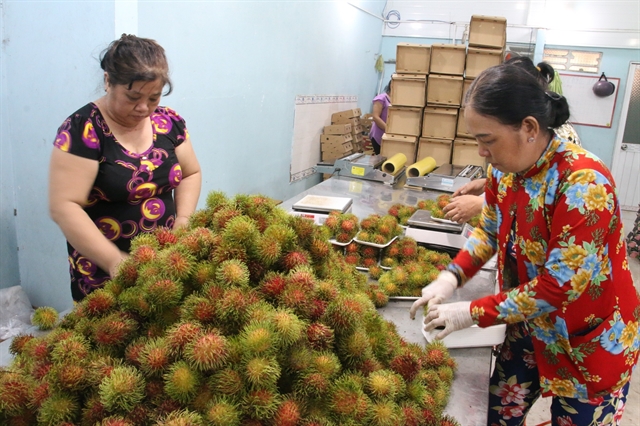 Society
Society

 |
| Caption: Workers pack rambutan for export by the Phú Phụng Agricultural Co-operative in Bến Tre Province’s Chợ Lách District. — VNA/VNS Photo Công Trí |
BẾN TRE — The Mekong Delta province of Bến Tre has taken measures to improve the functioning of its co-operative sector to create jobs and improve rural incomes.
It has identified certain co-operatives to participate in a project for selecting, perfecting and replicating effective new-style co-operatives across the country in the 2021-25 period.
They include Bảo Thuận Fisheries Co-operative and Mỹ Chánh Agriculture Co-operative in Ba Tri District, Bến Tre Green Skin and Pink Flesh Grape Fruit Agriculture Co-operative in Châu Thành District and Thới Thạnh Agriculture Co-operative in Thạnh Phú District.
Thới Thạnh, established in 2017, grows coconut, breeds chicken and giant river prawns, supplies agricultural inputs, and offers various agricultural services.
It has 124 members who grow 200,000 organic coconuts a month on a total of 200ha.
Trần Quốc Ửng, its chairman, said: “The co-operative has identified organic coconut cultivation as [lucrative] for its members.”
It also semi-processes coconut flesh for the Lương Qưới Coconut Co. Ltd in Châu Thành District and makes coconut caramel sauce used for cooking.
The sauce has been recognised as a three-star product under the national “One Commune - One Product” programme.
Ửng said the co-operative would adopt a production model that has a value chain to create favourable conditions for members to sell their products and offers them steady prices for their inputs.
Nguyễn Minh Cảnh, deputy chairman of the province People’s Committee and head of its Steering Committee for developing the collective economy, said relevant authorities would help co-operatives operate efficiently, resolve their problems related to lands and loans and enable them to create linkages to sell their produce.
They would focus on developing new-style co-operatives, he added.
The province plans to establish at least three co-operatives this year that use high technology and develop value chains for key products.
It has 193 co-operatives with 49,674 members and 1,161 co-operative groups with 20,779 members, according to its Co-operative Alliance.
Their combined revenues topped VNĐ194 billion (US$7.8 million) last year and their members had an average income of VNĐ5-7 million ($200-280) a month.
They are in industrial production, including cottage industries, agriculture, fisheries, credit services, trading, transport, natural resources, and environment.
Agricultural co-operatives account for a large number of the province’s total co-operatives but most of them are small with limited management capacity and unstable linkages between various stakeholders.
The Co-operative Alliance has helped resolve difficulties faced by co-operatives and safeguard their members’ benefits, Nguyễn Thanh Phương, its chairman, said.
It has enabled them to get soft loans, improve their management skills and carry out promotions for their products, he said.
It has provided consultancy and organised fairs to help co-operatives increase their competitiveness, he said.
It plans to strengthen advocacy activities to encourage the establishment of more co-operatives, he added.
The province hopes to have 225 co-operative in 2025, including 167 in farming, by 2025. — VNS




